They thought college wasn’t for them. Now these siblings are at UC Berkeley
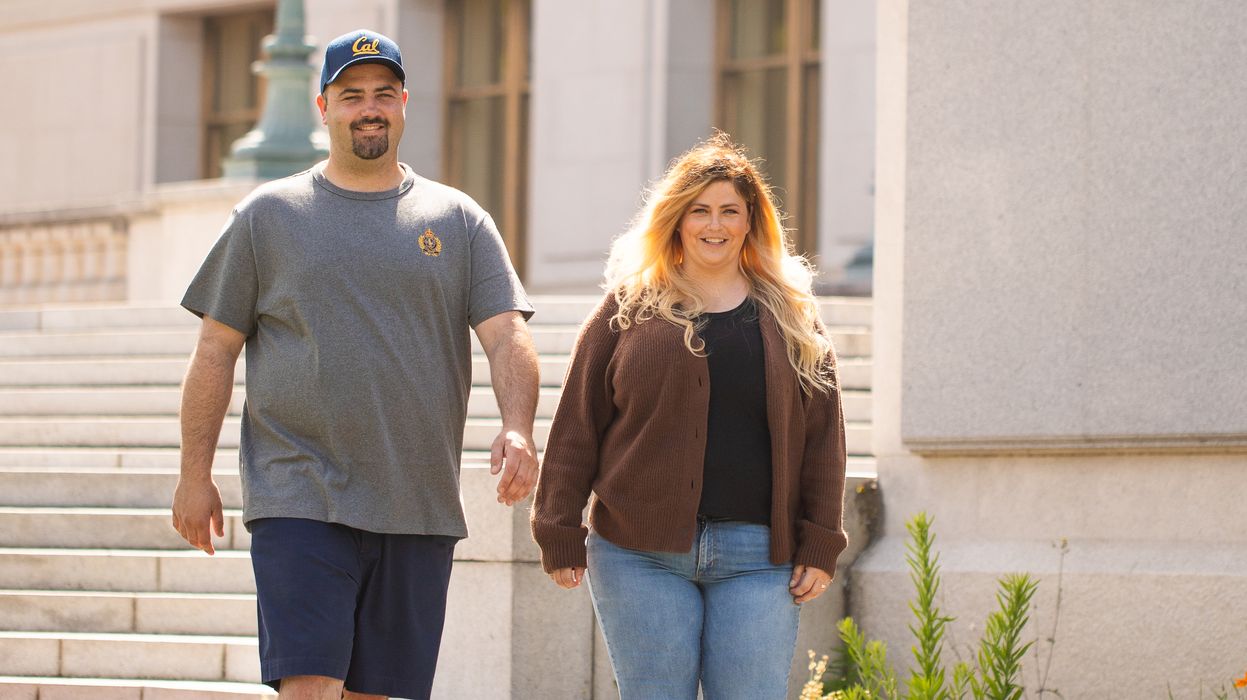
Brandon Sánchez/UC Berkeley
August 22, 2023
Ryan Mattson, 35, and his older sister, Melissa Mattson, 39, never used to see themselves as the college type.
Until 2021, Ryan was making decent money installing air conditioners. He lived in the same East Bay apartment complex as Melissa, who worked for a property management company. Ryan was raising a teenage son and was a father figure to Melissa’s daughters — both siblings had had children at a young age. No one in their family had attended college. More than two decades ago, a demotivated Melissa dropped out of high school after her teachers said she wasn’t cut out for academia.
They figured their lot in life was locked in. That is, until Ryan slipped off a ladder in 2021, herniated a disc in his back and badly damaged soft tissue in his shoulder. It was a painful workplace accident that doubled as a fortuitous, life-altering catalyst for the Mattson siblings.
Ryan recalls maddening boredom in the days after those first doctor appointments. He’d worked manual labor jobs since he was a kid — work that relied on strength and endurance. Idle time was not just unfamiliar. It was downright uncomfortable.
So in July 2021, Ryan signed up for courses at Sacramento City College. It was that in-between time two summers into the pandemic, and many classes remained online. That meant he could log in from his apartment in eastern Contra Costa County, where he and Melissa also cared for their ailing father. If anything, Ryan figured the coursework might help him leverage a pay raise when he returned to work.
He never imagined he’d soon be competing with his sister for a higher grade-point average or that they’d both end up at UC Berkeley this fall, pursuing similar degrees in the social sciences.
I didn’t really ever think I was going to be a bachelor’s degree type of person.
Ryan Mattson
“I didn’t really ever think I was going to be a bachelor’s degree type of person,” Ryan said. “Somehow, the stars aligned.”
Part of Ryan’s general education requirements at the community college included History 310: U.S. History to Reconstruction. He’d never opposed reading, per se. But most of the books he picked up were technical manuals related to electrical components and air conditioners.
For the first time in the fall of 2021, though, Ryan was all-in on school. He’d stay up late reading about wars and leaders and long-gone societies. He’d listen to lectures and consume books at twice the normal speed so he would have time to dig deeper. He peppered his instructor with questions.
Ryan’s interest didn’t go unnoticed. One day, that history professor, Dominic Cerri, told Ryan about his own background. He’d arrived at college in 1986 with plans to study physical education before being gripped instead by history. All these years later, encouraging Ryan was his chance to pay it forward. Cerri encouraged him to switch his main academic focus to history.
“I think you’re born for it,” Ryan remembers Cerri saying.
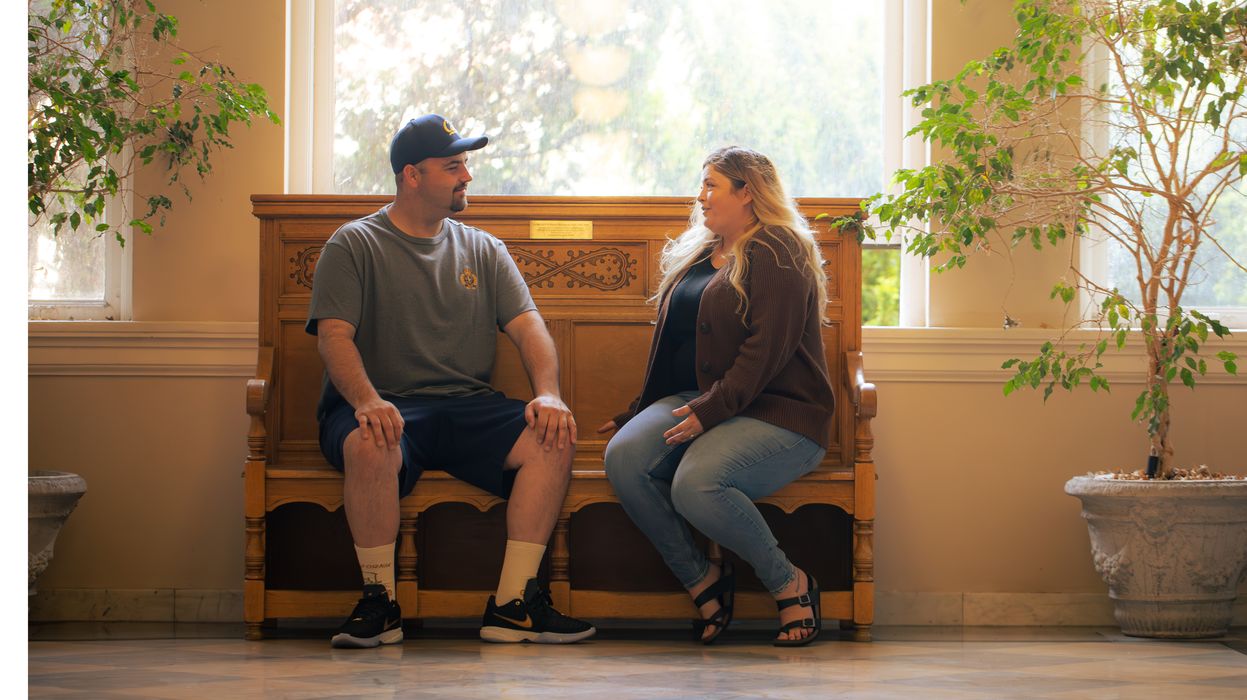
Brandon Sánchez/UC Berkeley
From individual studying to sibling rivalry
That summer, Melissa started eavesdropping on those history lectures and others from her brother’s social science curriculum. She had always been a voracious reader, sometimes devouring a book a day for fun. What made these lectures particularly noteworthy, she said, was how Cerri centered history around women — not just white men.
A single mother of two daughters, Melissa had spent years at her property management job badgering tenants who had fallen behind on rent. The task had made her cringe, especially during the pandemic.
Fed up, she left the job around the time Ryan, a single dad, entered Sacramento City College.
“I would rather do something positive for society instead of harming it or being complicit,” Melissa said. “I just felt like it just wasn’t for me anymore. I had already kind of felt that way before the pandemic, but the pandemic really cemented that for me.”
She became inspired to sign up for her own classes there. Ryan may have had a semester’s head start, but the race was on by fall 2021. She took a full course load her first semester in an attempt to catch her brother, which spurred him to sign up for even more classes.
“It just kept on escalating. It was a sibling rivalry, for sure,” Ryan said. “We were pushing each other.”
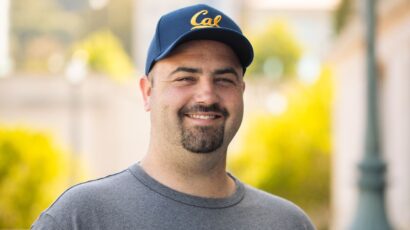
Brandon Sánchez/UC Berkeley
Ryan got one B in his first semester, before Melissa enrolled.
It was the only time he didn’t receive an A in his two years at the college.
Melissa was motivated less by sibling rivalry and more by knowing that every course she took was pushing back against the expectations others had had of her. In ninth grade, a teacher told Melissa’s parents that she wasn’t a strong enough student to graduate from high school, let alone to go to college. The experience demotivated her. She dropped out in 2002 during her senior year before earning her GED two years later.
By her early 20s, work and raising a toddler alone became all-consuming.
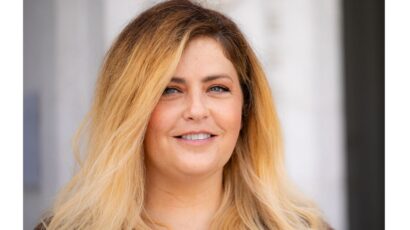
Brandon Sánchez/UC Berkeley
“We never pictured ourselves going anywhere,” Melissa said of she and her brother, noting that none of the women in the family had completed high school.
So it was thrilling 20 years later, she said, to excel in the social science courses she took at Sacramento City College in fall 2021. Modern Latin America and Caribbean history. Introduction to International Relations. Diversity in American Theater. Women and Gender Studies.
“I always felt like I was less than because I got my GED,” Melissa said. “So my first semester, when I did 18 units, and it was straight A’s, it made me realize that maybe I was onto something.”
Seeing Melissa’s success, a counselor at the college encouraged her to call universities and ask about application requirements. Melissa had always thought Berkeley was out of reach. But she felt a surge of anticipation when she mentioned having a 4.0 GPA to a Berkeley admissions officer.
“I’ve always loved history. I love reading. So history just fit for me,” she said, adding that she was especially interested in social movements, revolutions and systemic change. “I was just really highly motivated to go to Berkeley. That was really what drove me.”
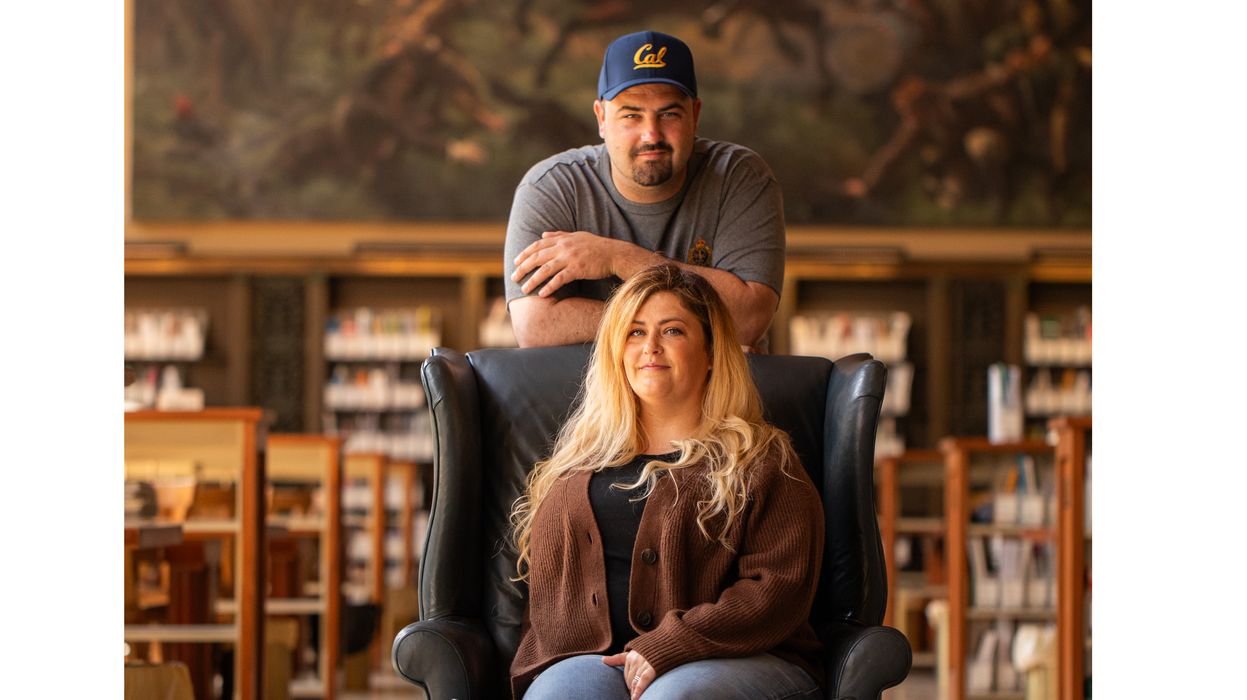
Brandon Sánchez/UC Berkeley
Cerri, the siblings’ history professor, said he especially valued their enthusiasm and positive energy. It showed in their discussion posts that helped others understand certain historical facts and, critically, their relevance. He recalled the Mattsons’ contributions to a campus panel discussion about the implications of the Supreme Court’s decision that overturned the constitutional right to abortion.
“Because both returned to their education after long breaks in which they managed the grind of work and the challenges of family,” Cerri said, “it provided them with a maturity and real-world experience that fueled their passion for learning and desire to promote social change.”
When they graduated last spring with associate in arts degrees, the Mattsons each had a long list of specialties: history, political science, women and gender studies, humanities, and the social sciences. They both also tacked on a legal studies certificate.
They feel that this array of accomplishments might be a good foundation for law school.
In Ryan’s personal essay for his application to Berkeley, he described his struggle to raise the son he’d had at 19; feeling he’d previously failed in earlier attempts at community college because of a need to earn an income by working manual labor jobs; and finding a new path in life the past couple years.
He dared UC Berkeley to throw him a challenge he couldn’t overcome.
“Prove me wrong,” he wrote.
Application and acceptance to Berkeley
One afternoon in May 2023, Ryan was driving his sister and a friend through an Interstate 80 traffic jam. Melissa checked her phone, then nervously tapped the screen to open an email from Berkeley. “Congratulations…”
“I just texted everybody,” Melissa recalled. “I was about to cry. I couldn’t believe I got accepted.”
Eager to know whether he’d also been accepted, Ryan handed his phone to Melissa. She opened the decision letter for him and relayed the life-changing news. He, too, had gotten in.
They both were accepted at Columbia University, too. But with home and family being in the East Bay, and Berkeley being Melissa’s dream school, choosing between the two was easy.
I would rather do something positive for society instead of harming it or being complicit.
Melissa Mattson
Ryan and Melissa took three online courses at Berkeley this summer and will begin their studies on campus and in earnest this fall. They still live next to each other, and Melissa is continuing part-time work as a mentor at the writing center at Sacramento City College. Ryan in the spring plans to begin teaching online courses on air conditioning repair work at San Diego City College. The two of them plan on taking the same courses at Berkeley, at least starting out. That way, they can share the commute and class notes.
As transfer students, they aim to graduate in spring 2025. That might just be just the beginning.
“The way I see it is, the bachelor’s degree is just a stepping stone for us,” Ryan said. They both agree that graduate school or law school could be next.
Both are laser-focused on creating change in the world. Ryan is interested in history; Melissa in social movements and in housing reform and tenant protections.
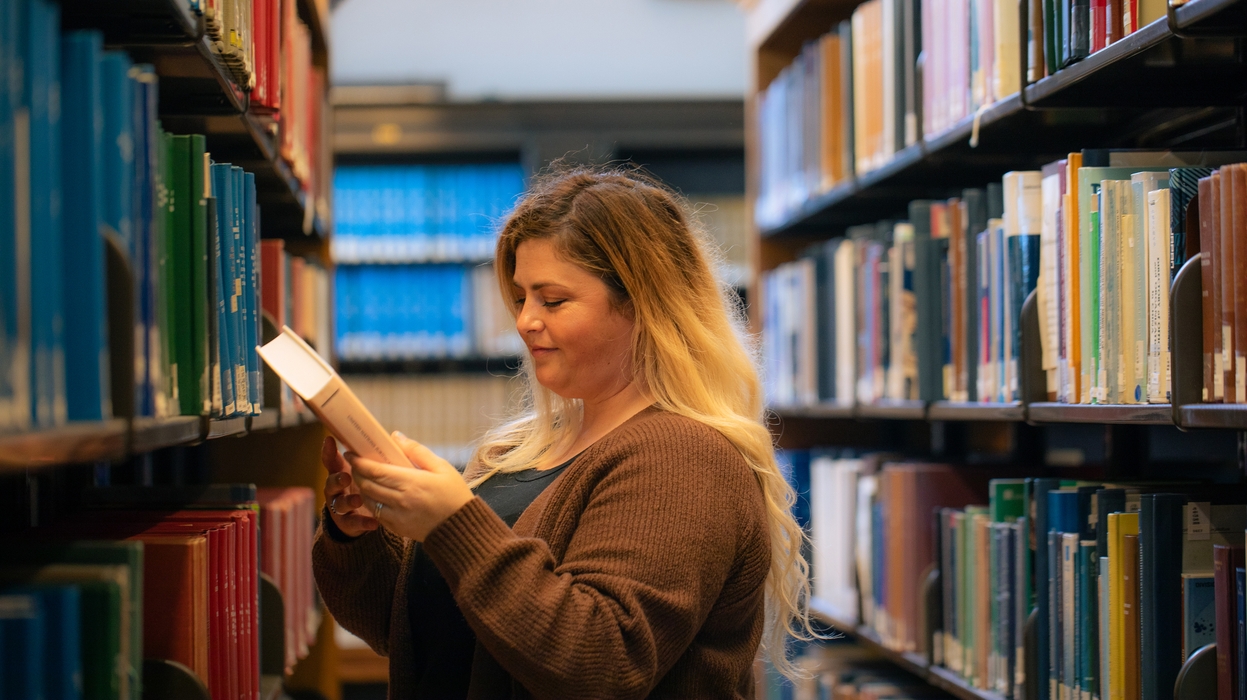
Brandon Sánchez/UC Berkeley
They admit feeling some anxiety at the thought of being nontraditional students on campus who are significantly older than many of their classmates. The flip side, they said, is that previously, they have more easily identified with their college instructors, who they sometimes saw as peers.
At community college, they treated school like a full-time job, putting in 10-hour workdays. They plan to do the same at Berkeley, realizing that it might be difficult at times to relate to classmates about the same age as their children. They plan to join Older Wiser Learners (OWL), a group of Berkeley students who differ from those who arrive immediately after high school.
Breaking with convention has become the norm for more than a few Mattsons. Melissa’s oldest daughter, Makaylah, who turned 16 this summer, also didn’t initially think she was college material.
Seeing Melissa and Ryan graduate from community college with honors changed that. Lately, Melissa has spent hours researching college options with and for her daughter.
Melissa said her own journey made Makaylah “feel like if I could do it, she could do it. It made it achievable for her.”
She paused for a moment, then added what many Berkeley students say is their mission on campus and in the world.
“It’s about breaking those boundaries.”